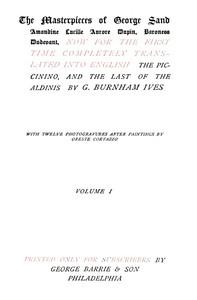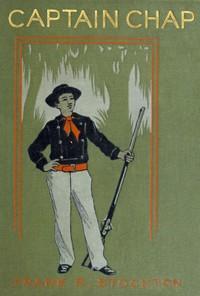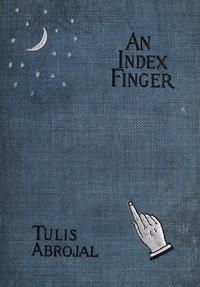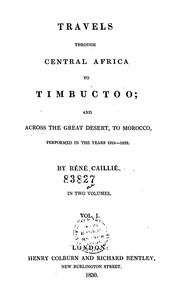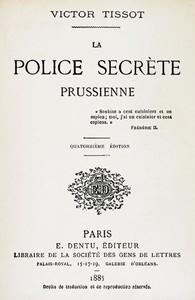|
|
Read this ebook for free! No credit card needed, absolutely nothing to pay.Words: 43419 in 15 pages
This is an ebook sharing website. You can read the uploaded ebooks for free here. No credit cards needed, nothing to pay. If you want to own a digital copy of the ebook, or want to read offline with your favorite ebook-reader, then you can choose to buy and download the ebook.

: The Piccinino Volume 1 (of 2) by Sand George Cortazzo Oreste Illustrator Ives George Burnham Translator - French fiction Translations into English@FreeBooksThu 08 Jun, 2023 agnanimity and vindictiveness. He has a portion of his father's virtues and good qualities. His vices and failings are of a different sort. Like his father, he is loyal in friendship, and his oath is sacred; but while his father, even when carried away by fierce passions, was always a true believer, and indeed devout in the depths of his heart, the son, if I am not mistaken, and if he has not changed, is the most placid and coolest atheist that ever lived. If he has passions, he gratifies them so secretly that they cannot be discovered. I know of but one, and that I have made no attempt to overcome,--it is hatred of the foreigner and love of country. That love is so intense that he carries it even to love of locality. Far from being a spendthrift like his father, he is economical and orderly, and owns a pretty little estate at Nicolosi, with a garden and some land, where he lives almost always alone, to all appearance, when he is not on some secret expedition in the mountains. But he arranges his absences with so much caution, and receives his friends with so much mystery, that no one ever knows whether he is away from the house, or in his garden, smoking and reading. In order to preserve this skilfully managed freedom of action, he makes a practice of not replying or showing himself when anyone knocks at his door. So that, when he is ten leagues away, no one can say that he is not kept within the walls of his fortress by a fit of unsociability. "I can understand that this man is a hero in your eyes, uncle, while you have difficulty in esteeming one whose qualities are so faintly outlined as mine." "I esteem the quality of words, not their number," replied the Capuchin. "You have said two or three words which satisfy me, and as for my hero, as you call him, he is so far from being lavish with them that I have had to judge him by deeds rather than by speech. I, myself, rarely speak of matters upon which I feel very strongly, and if you find me prolix to-day, it is because I am obliged to tell you in two hours what I have had no chance to tell you in the eighteen years that you have been in this world, a stranger to me. However, reserve is not a defect in my eyes. I loved Castro-Reale as I shall never love anybody else; and we passed whole days together, by ourselves, without speaking a word. He was suspicious, as every true Sicilian should be, and so long as he distrusted himself and others, he had a noble heart and a noble spirit." "The young man we are going to see must be very deeply attached to you, uncle, since you are sure of finding him prepared to receive me?" "If he loves anyone on earth, I am that one, although I scolded and worried him well when he was my pupil. However, I am not perfectly certain that he will grant what I have to ask him in your behalf. He will have to overcome some repugnance; but I hope for the best." "Doubtless he knows all that you will not allow me to know myself of my affairs and my destiny?" "He? he knows nothing whatsoever of them, and he shall know nothing before you do. The little that you are both to know for the present, I will tell you both. After that, it may be that the Piccinino will guess more than he should. His penetration is very keen; but whatever he may guess, he will never tell you; and he will never ask you what he wants to find out; my mind is at rest so far as that is concerned. Now, silence; we are coming out of the woods into a cultivated and settled part of the mountain. We must be seen by as few people as possible on our way to the place where our man awaits us." They walked silently and cautiously along hedges and clumps of trees, keeping in the shadow and avoiding trodden paths; and in the gathering dusk they soon reached the Piccinino's abode. IL PICCININO The Piccinino's house stood by itself on the mountain, about half a mile from the village, from which it was separated by a steep ravine; it was on the uppermost edge of a fertile tract, where the atmosphere was soft and balmy. A few hundred feet higher it began to be cold, and the terrors of the desert were foreshadowed by the absence of tilled land, and by ridges of lava so numerous and so broad that the mountain seemed inaccessible in that direction. Michel observed that the situation was particularly favorable to the purposes of a man who was half citizen, half outlaw. At home, he could enjoy all the comforts of life; on leaving his home, he at once escaped from the presence of his fellow-men and the requirements of the law. The hill, the slope of which was very abrupt on one side, but gentle and fertile on the other, was covered to its very summit with luxuriant vegetation, whose mysterious exuberance was sedulously fostered by an industrious and intelligent hand. Carmelo Tomabene's garden was renowned for its beauty and the great abundance of its fruits and flowers. But its entrance was jealously guarded, and it was enclosed on all sides by high verdure-covered palisades. The house, which was of considerable size and well built, although without apparent striving for effect, stood upon the site of a small abandoned fort. Some fragments of thick walls, and the base of a square tower, which had been utilized to strengthen and enlarge the new building, which bore the marks of extensive repairs, gave to the modest structure an air of solidity, and of semi-rustic, semi-seignoral importance. However, it was simply the dwelling of a well-to-do farmer, although one felt that a man of refined habits and tastes might find life enjoyable therein. Fra Angelo approached the gate, and pulled a bell-cord, which, starting among the honeysuckles in which the gate was embowered, followed a long vine-clad arbor and was connected with a bell inside the house; but the sound of the bell was so deadened that it could not be heard outside. The cord was not visible amid the foliage, and one needed to be previously cognizant of its existence to make use of it. The monk pulled the cord three times, at carefully measured intervals; then five times, then twice, then three times again; after which he folded his arms for five minutes, when he repeated the signals in the same order and with the same care. One ring more or less and the mysterious proprietor might have allowed them to wait all night without admitting them. Free books android app tbrJar TBR JAR Read Free books online gutenberg More posts by @FreeBooks
: Captain Chap; or The Rolling Stones by Stockton Frank Richard Stephens Charles H Illustrator - Teenage boys Juvenile fiction; Florida Juvenile fiction@FreeBooksThu 08 Jun, 2023

: An index finger by Abrojal Tulis - United States Social life and customs 19th century Fiction; Spiritualism Fiction; Interpersonal relations Fiction@FreeBooksThu 08 Jun, 2023
|
Terms of Use Stock Market News! © gutenberg.org.in2025 All Rights reserved.

